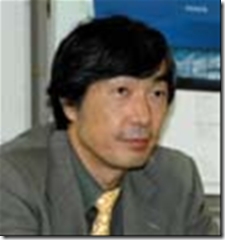[Interview] Professor Hideyuki Nakashima, President Future University, Internationally Renowned Computer Scientist and Visionary
This is the next blog in the continuing series of interviews with leading professionals.
In this blog series, we talk with Professor Hideyuki Nakashima: President Future University – Hakodate; the internationally renowned computer scientist, inspirational visionary and top-ranked leader.
I had the pleasure of meeting Dr. Nakashima at the invitation-only international large society summit where CIPS participated/presented. Hideyuki’s reputation for innovation and leadership is well known worldwide and this led to this blog series. Dr. Nakashima was the youngest professor to ever be offered the presidency of a university in the history of Japan, due to his significant and outstanding achievements. Dr. Nakashima is creating new branches of computer science and merging others that will impact the world into the future. It’s worth your time to follow his work. There is an element of “Star Trek” which I find compelling and in talking with Hideyuki, I can feel his passion…I wanted to share this with you too!
Thank you and Enjoy!
Stephen Ibaraki, FCIPS, I.S.P., MVP
______________________________
Stephen : Hideyuki, you bring a lifetime of considerable success, notable achievements and substantial contributions to our discussion. We thank you for doing this interview with us and sharing your deep insights with our audience.
Hidey: Thank you for this opportunity to express my view to the world.
Stephen : At the time you became president of Future University in 2004, you were the youngest professor appointed to such a prestigious position. This is a remarkable achievement. What do you hope to accomplish in your role as President?
Hidey: I would like to use my position at the university to transfer my ideas to the world. Future University - Hakodate (we call it FUN) is an ideal place for this purpose because its main focus is in Information Science.
For the sake of simplicity, I will divide my life-span into two phases and estimate that I will live for 100 years. I used the first 50 years to learn and train myself and to conduct research in order to gain knowledge and insights into the nature of information processing. As I approached the age of 50, I decided to use the latter half to transfer what I had learned,(through my research activities), to the younger generations. (Incidentally, the invitation to become President came when I was 50 years old!)
Stephen : What is the focus of your university?
Hidey: FUN is a new university which was established in 2000. It focuses on information science and consists of only one faculty: Systems Information Science which has two departments, Complex Systems and Media Architecture. The research and education at FUN covers hard-core computer science, cognitive science, information system design and complex systems. I am quite interested in research fusion of the themes of these two departments. It is obvious not only that intelligent systems are complex systems, but also that there are many inter-field applications such as use of complex dynamical system to produce unexpected designs.
Stephen : What do you hope to achieve through your Complex Systems department? How will its impact be felt?
Hidey: The Complex Systems department is the first department of its kind in Japan. We have Professor Ueda, (who is the first finder of the Chaos phenomena in the world), in the department. Thus the department acts as a "sign board" of our university. However, the concept of the complex system is hard to apply to designing practical systems because it cannot be defined in a positive sentence. It is usually defined as "a system that cannot be understood by dividing it into simpler parts". How can we use this concept? How can this affect research directions of the new information systems? I have asked both departments, (Complex Systems and Media Architecture), to come up with new collaborative research issues. If we succeed, we can be number one in the world in the new research field.
_____________________
Dr. Nakashima’s Profile
 Professor Hideyuki Nakashima is president of Future University - Hakodate (FUN), a position he has held since 2004. Prior to this, he was the director of Cyber Assist Research Center, National Institute of Advanced Industrial Science and Technology (AIST).
Professor Hideyuki Nakashima is president of Future University - Hakodate (FUN), a position he has held since 2004. Prior to this, he was the director of Cyber Assist Research Center, National Institute of Advanced Industrial Science and Technology (AIST).
His research field includes Multiagent systems, Artificial Intelligence, (in particular, knowledge representation and reasoning, and cognitive science). He is currently interested in a new methodology for complex information processing as well as societal application of information processing technologies.
Dr. Nakashima is very active in academic societies. He is vice president of the Information Processing Society of Japan (IPSJ) and is also an IPSJ fellow. He was the president of the Japanese Society of Cognitive Science from 2003 to 2004. He was a board member of International Federation on Multiagent Systems from 1999 to 2004. He served as a programming committee co-chair for International Conference on Multiagent Systems (ICMAS) in 2000 and in 2006, as a general co-chair for the International Conference on Autonomous Agents and Multiagent Systems (AAMAS ), and as general co-chair for Pacific Rim International Conference on Artificial Intelligence (PRICAI). He has also served as a programming committee member for many international conferences including International Joint Conference on Artificial Intelligence (IJCAI), ICMAS, AAMAS and UbiComp.
He received his Ph. D. in information science at the University of Tokyo in 1983. Visit his website at https://www.fun.ac.jp/~nakashim/welcome.html.
________________________
In the next blog, Hidey will talk about:
- Top challenges/solutions/roadblocks at President;
- Impact of Information Science;
- Future contributions;
- Future applications;
- Implications of complex information processing.
I also encourage you to share your thoughts here on these interviews or send me an e-mail at sibaraki@cips.ca.
________________________